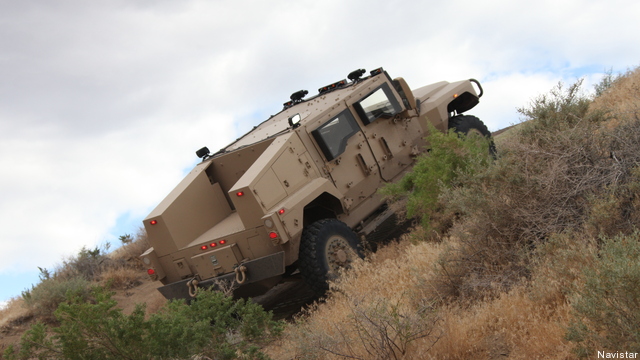Navistar Pulls JLTV Protest
Posted on
 [UPDATED 12:45 pm] Truck maker Navistar is withdrawing the protest it filed Friday with the Government Accountability Office over the Joint Light Tactical Vehicle program, company spokeswoman Elissa Koc told Breaking Defense this morning.
[UPDATED 12:45 pm] Truck maker Navistar is withdrawing the protest it filed Friday with the Government Accountability Office over the Joint Light Tactical Vehicle program, company spokeswoman Elissa Koc told Breaking Defense this morning.
Had Navistar persisted, its protest probably would have delayed JLTV development for months while the GAO investigated whether the military ran the competition fairly.
The Joint Light Tactical Vehicle (JLTV) is a $15-billion-plus effort by the Army and Marine Corps to replace many — not all — of their vulnerable Humvees and unmaneuverable MRAPs with almost 55,000 well-armored but agile new trucks. The military awarded $187 million in engineering, manufacturing, & development (EMD) contracts on Aug. 22 to three firms: aerospace giant Lockheed Martin, truck maker Oshkosh, and Humvee maker AM General. Rejected were bids from BAE, General Dynamics, and Navistar — although Navistar says it may still develop its design further on its own dime and compete for the production contract when it comes up for bid in 2015.
Companies are willing to spend their own money on a shot at winning JLTV because it is by far the biggest program going in the tactical wheeled vehicle market. Navistar in particular could use a win after it gambled on new engine technology that failed to meet EPA emissions targets, leading to massive fines and the ouster last week of CEO Daniel Ustian.
Protests to the GAO have become almost routine on such high-stakes defense procurements. After all, the rejected bidders have little to lose by gumming up the works for everyone else, which slows down the already dysfunctional acquisition system even more. That Navistar withdrew its protest suggests either that the Army ran an impeccably tight ship on the EMD award or that Navistar’s executives felt pangs of public-spiritedness, or both.
Navistar’s Koc explained to Breaking Defense that the company faced a, “speak now or forever hold your peace” deadline to file a protest or lose the opportunity forever. Once they filed, Navistar then had time to examine the competition more closely over the Labor Day weekend and decided to withdraw.
“We had a very limited amount of time in order to make a filing, so we did so [because] we had some initial concerns; and then today we decided to withdraw that protest. It’s not yet formalized, but we’ve begun the process [of withdrawal],” Koc said.
With the cost per vehicle set at $250,000, analyst Loren Thompson told Breaking Defense, “the Army is driving a very hard bargain in the JLTV competition and Navistar may have decided that whatever the merits of their proposal were, it’s just not worth the effort to chase razor-thin margins.” Thompson is a defense industry consultant, the chief operating officer of the Lexington Institute, and a frequent contributor to Breaking Defense. “The Army’s acquisitions system is becoming increasingly professional and as it does there’s less latitude for successful protests.” (The Army manages the JLTV program on behalf of both itself and the Marines).
Across the acquisitions world, Thompson went on, there are more protests than five or six years ago; however, the trend is unclear in terms of whether the protests are successful, [and] protests can become expensive — not just in the financial sense but in the sense of offending customers who feel their time is being wasted.”
So while Navistar’s reversal seems remarkably rapid, it may also have been wise.
Subscribe to our newsletter
Promotions, new products and sales. Directly to your inbox.
